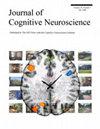语言和注意系统之间的相互作用:早期自动词汇加工?
IF 3.1
3区 医学
Q2 NEUROSCIENCES
引用次数: 74
摘要
一个正在进行的争论是皮层表征是自动的还是依赖于注意过程。为了解决这个问题,我们调节了听觉输入的注意力水平,并记录了音节完成声学匹配的单词和假词所引起的erp。在非注意条件下,单词引发的反应(在约120毫秒达到峰值)比对假词的反应更大,证实了词汇记忆痕迹的早期激活。然而,当注意力转向听觉输入时,这种词-伪词差异消失。而对单词的反应似乎不受注意变化的影响,早期的假词反应受到注意的显著调节。随后,所有刺激的注意在~ 230 msec时调节一个正偏转,在~ 370 msec时调节第二个负偏转。结果表明,单词加工的最早期阶段不受注意需求的影响,具有一定的自动性,注意对词汇加工的影响在150 ~ 200 msec后逐渐累积。我们通过对单词的预先存在的记忆网络的鲁棒性来解释这一点,这些单词的强大内部连接保证了快速的全面激活,而不管可用的注意力资源如何。相反,假词的加工过程没有这种刺激特异性的皮层表征,似乎受到注意力资源的强烈调节,甚至在其最初阶段也是如此。地形分析和源重构结果表明,左半球皮层介导了记忆痕迹激活的注意效应。本文章由计算机程序翻译,如有差异,请以英文原文为准。
Interactions between Language and Attention Systems: Early Automatic Lexical Processing?
An ongoing debate is whether and to what extent access to cortical representations is automatic or dependent on attentional processes. To address this, we modulated the level of attention on auditory input and recorded ERPs elicited by syllables completing acoustically matched words and pseudowords. Under nonattend conditions, the word-elicited response (peaking at ∼120 msec) was larger than that to pseudowords, confirming early activation of lexical memory traces. However, when attention was directed toward the auditory input, such word–pseudoword difference disappeared. Whereas responses to words seemed unchanged by attentional variation, early pseudoword responses were modulated significantly by attention. Later on, attention modulated a positive deflection at ∼230 msec and a second negativity at ∼370 msec for all stimuli. The data indicate that the earliest stages of word processing are not affected by attentional demands and may thus possess certain automaticity, with attention effects on lexical processing accumulating after 150–200 msec. We explain this by robustness of preexisting memory networks for words whose strong internal connections guarantee rapid full-scale activation irrespective of the attentional resources available. Conversely, the processing of pseudowords, which do not have such stimulus-specific cortical representations, appears to be strongly modulated by the availability of attentional resources, even at its earliest stages. Topography analysis and source reconstruction indicated that left peri-sylvian cortices mediate attention effects on memory trace activation.
求助全文
通过发布文献求助,成功后即可免费获取论文全文。
去求助
来源期刊
CiteScore
5.30
自引率
3.10%
发文量
151
审稿时长
3-8 weeks
期刊介绍:
Journal of Cognitive Neuroscience investigates brain–behavior interaction and promotes lively interchange among the mind sciences.

 求助内容:
求助内容: 应助结果提醒方式:
应助结果提醒方式:


